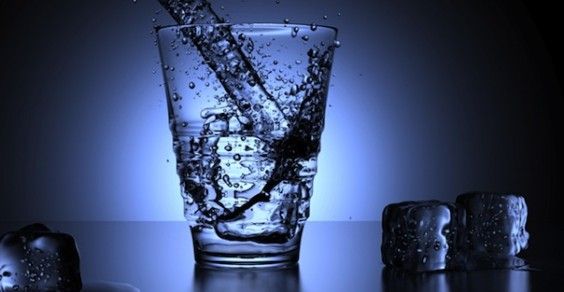Greatist News examines and explains the trends and studies making headlines in fitness, health, and happiness. Check out all the news here.
First Lady Michelle Obama’s “Let’s Move” initiative broke new ground in making healthy living a government priority. Financially, it makes sense: As obesity rates have soared, healthcare costs have risen; so much public spending occurs due to the effects of unhealthy lifestyles, it was only a matter of time before the White House openly addressed their causes. Now, Let’s Move has a new program that is decidedly less dramatic than giving up fast food or buying organic produce — you just need to turn your faucet.
What’s the Deal?
The First Lady’s new, nationwide Drink Up campaign starts with a single goal: to get people drinking one more glass of water every day.
“We’re aiming to make a huge splash,” she said at a pun-filled unveiling in Watertown, Wisconsin. “Drink just one more glass of water a day and you can make a real difference for your health, for your energy, and the way that you feel.”
Mrs. Obama delivered her message on a dozen TV programs, including Today, Good Morning America, and Un Nuevo Dia, and has demonstrated public support through an Instagram campaign that asks fans to photograph themselves raising a glass of water and use the hashtag #DrinkH2O. The campaign, entitled “Drink Up,” also benefits from the sponsorship of a litany of companies that (unsurprisingly) include Aquafina, Evian, and the International Bottled Water Association.
Why It Matters
Drink Up points to studies suggesting 43 percent of Americans drink less than four cups of water per day, and seven percent do not drink water daily
There’s good reason for concern here. Adequate hydration is critical for transporting nutrients to cells, flushing waste, regulating body temperature, and protecting sensitive tissue, like the nose, mouth, and eyes
However, the initiative has been the target of some criticism, largely because there is no recommended daily intake of water. The Center for Disease Control and Prevention considers four cups per day to be a moderate amount, and the Institute of Medicine simply states, “the vast majority of healthy people adequately meet their daily hydration needs by letting thirst be their guide.” With no official, government-sanctioned body providing a recommended amount of water to drink, how is the White House able to tell us to drink more?
One reason might be that Americans have a tendency to drink their calories. In a country struggling to keep its head above the tide of obesity, many need to be reminded that innocuous beverages like soda, and even juice and milk, can add hundreds of unnecessary calories to one’s diet. Water, on the other hand, is an easy, zero-calorie way to help fill the stomach, contribute to satiety, and curb weight gain.
In any event, the campaign can probably do no harm, as it’s exceedingly difficult to drink too much water. Typically, drinking more water than the body needs will simply result in more frequent urination, and may even reduce the risk of kidney stones.
The Takeaway
It’s true that the initiative suffers from a lack of hard science and specific direction. And it’s crystal clear that the companies supporting the campaign have a vested interest in getting Americans to drink more water (Drink Up also received some criticism for not focusing on the environmental concerns of buying water bottles).But simply adding more water to one’s diet could have a pretty profound impact beyond hydration: namely, fewer sugary drinks and lower food consumption.
The White House’s implication that the U.S. should drink water and not sugar is one that should perhaps be stated more openly, but the campaign’s simplicity may be its strength. Just remembering to drink a little more water is an indirect way to cut calories without even noticing it — and Americans could probably stand to consume fewer calories. While Drink Up has a ways to go in making these effects clear, the battle against obesity could use all the help it can get.
Got something to say? Let us know in the comment below, or tweet the author @ncjms.


